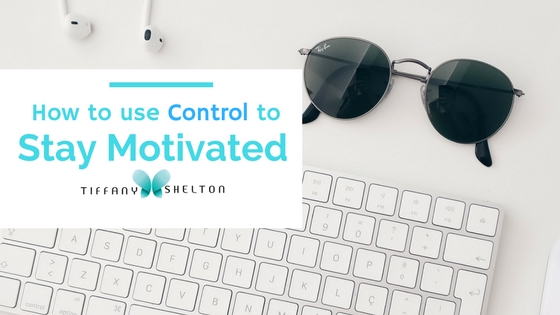Conscious Go Getter Blog Series:
How to use Control to Stay Motivated in Your Hustle
Today I will give you quick and simple ways to increase your internal locus of control and stay motivated in your hustle.
“The first and best victory is to conquer self.” – Plato
Look…
Most of us can agree that feeling in control of our lives is essential to happiness and well-being. And so it should be no surprise that an internal sense of control over what happens to you is a key component to staying motivated on your conscious journey to reach your dreams.
What’s the real story behind control and motivation?
When I was in high school I was a high achiever and there was moment when this concept became crystal clear. At the time I was considering becoming a doctor, and I was very excited to be in my new anatomy class. Our school valedictorian was in my class, and he had a reputation for being a genius. I thought it was inevitable that he would perform the best in our class because after all, he was just naturally smart. I thought he was just born a genius and I ascribed his academic prowess to innate ability outside of his control. However because I was interested in the class material, I began to study like I had never done before. I read the textbook from cover to cover, and took copious notes. In class when I was confused I made a point to ask as many questions as needed to understand, and I had the teacher give examples that made learning easier for me. At the end of the year, not only did I perform better than anyone in the class, but I realized that my achievements in this class weren’t because I was naturally smart, but because I worked my ass off and took the time to learn what I didn’t know. This was a valuable lesson in my life, and my perception of our valedictorian went from viewing him as a genius to viewing him as disciplined and hard worker. More importantly I learned that I was in control of my achievements, as long as I was willing to do the hard work.
Here’s the Deal
This is what the concept of internal locus of control is all about. There are many studies that describe the correlation between internal locus of control and increased motivation(Karaman, 2017). Whereas motivation is about why we do something (see previous blog), locus of control is about how we view the events that occur in our lives.
According to psychological research on the topic (Jatkevicius, p. 78, 2010), those with high internal locus of control believe their will and behavior is directed by their own internal decisions, and therefore feel they have more influence on their environment. On the other hand Jatkevicius describes those with high external locus of control believes that one’s behavior and results are guided by circumstances out of one’s control.
Why Does this Matter?
High levels of external locus of control is correlated with mood disorders like depression, poorer life satisfaction, shorter marriages, and lower levels of motivation (Duhig, 2017). It’s easy to see how constantly feeling as those things are happening to you and not by you can contribute to feelings of hopelessness and lack of motivation. In fact, many clinicians treat depression and low motivation by getting their clients to explicitly take back control of their lives. Researchers have even found that attributing success to chance (external locus of control), is correlated with higher stress levels (deCarvalho, 2009) and poor health outcomes (Lefcourt, 1982, p. 103).
So What Does Internal Locus of Control Look Like?
According to professor Ronald Donaldson (2014), there are some key characteristics of those with high internal locus of control including:
- The attitude that you are in control of your success and failures
- Valuing a positive attitude
- Accepting responsibility for your actions, achievements, and failures
- Understanding that your success and failures comes from your own effort
The Brain and Locus of Control
With control comes predictability, and these two elements result in greater mental and physical health. As the experiment in this video details, learning to predict and control the events in your life increases your sense of mastery and confidence. Furthermore, when we feel we can’t control or predict what will happen to us, we are overwhelmed with stress hormones, which over time cause serious health problems such as stomach ulcers, and depression. A recent study found that those with internal locus of control were shown to have several larger brain regions than those with external locus of control. They also found that there are many brain systems correlated with locus of control including cognitive, socioemotional, self-regulatory, and reward systems (Hashimoto et al., 2015).
The Reality of External Forces
As a woman of color, I have difficulty processing my own internal locus of control living in a world and country that because of who I am (a Black woman) certain things happen to me on a frequent basis that are out of my control. Oppressive systems and actions make external locus of control a part of my reality. So how can those from minority groups just ignore reality and sure up our internal locus of control when innocent Black men are being murdered on a daily and the cops who kill them are going free? How can I view myself as in control when women continue to make significantly less than men in this country despite being just as qualified and capable. Researchers on internal locus of control have noted this dilemma as well. Maragret Todd of Syracuse University (2010) explains how ethnic minority groups and women have been shown to have fatalistic, external control beliefs. This easily explains health disparities for minority groups considering the physical effects of external locus of control noted above. However, this tide is turning at the same rate that we as a society are progressing towards less inequality.
What to Keep in Mind
So before I detail universal ways to increase your locus of control, I would like to preface it with a tip for anyone from a minority group that experiences oppression. Instead of blindly ignoring the reality that there are external factors that impact your life, consciously become aware of this reality and process it in a way that works for you (i.e mind-body work, therapy, prayer, etc). And then, I propose you balance this reality with the reality that you are also a chain breaker. One helpful way to do this is to keep in mind chain breaking archetypes that took control of their lives and had their own answer to oppression and barriers. Examples of such role models include Oprah, Harriet Tubman, Rosa Parks, Nina Simone, Gloria Richardson etc. Yes we live in a world with oppression, but we also live in the world where you have the power to break chains in your own way.
So what can you do to increase your internal locus of control? ….
Here are 3 Conscious Tips to help you increase internal locus of control and stay motivated:
One: Celebrate HARD WORK not just Accomplishments
I can’t emphasize this enough: It’s about the journey not the destination. And to stay motivated in your hustle, you have to CELEBRATE THE JOURNEY. Or as motivational speaker Brendan Burchard says, “Honor the Hustle”. When I was at one of his workshops and heard him say this, it changed my life. I began to truly honor my hard work, and I took time to celebrate the days I worked my ass off. I also began to feel odd on those low motivation days because there was no hustle to honor at the end of the day. And as result those days have been less and less, to the point now everyday I wake up excited to hustle. I push myself to work hard towards my goals because I know that is the determining key to my success. As long as you continue to be a conscious go-getter, (someone who is constantly learning and evolving, works hard, and values self-care) accomplishment is inevitable. Here’s are some easy tips to help you start celebrating hard work and not just accomplishments:
- Treat yourself with special rewards like chocolate at the end of a day full of hard work and conscious hustling.
- Up the ante and reward yourself more graciously for seasons that you hustled particularly hard, such as at the end of a school semester, after the launch of a product, or after a special project. Celebrate such grand hustling with grand rewards like getting a massage or taking a weekend trip.
- Acknowledge hard work by consciously balancing it with self-care and rejuvenating practices. You should relax and unwind just as hard as you hustle. As a conscious go-getter you must be present with how much you are really working and be sure to balance it out with other fulfilling activities as well.
- Take note of how your hard work is paying off. When you begin to become more mindful of the consequences of your hard work, your sense of control over your life (internal locus of control) will increase.
TWO: Control Training
The great thing about the research on internal locus of control is that it is something that we can train ourselves to increase.
The best part: the more you practice controlling yourself and your life, the greater sense of internal locus of control you will have. This “Just Do It” philosophy is most effective in increasing motivation and internal locus of control, which is why it is also frequently used in the treatment of depression. As I mentioned above, a key component of motivation is action.
Here are some ways to begin training yourself in self-control and internal locus of control:
- Practice taking control and being the only one to make decisions about the direction of your life.
- Respond to other’s requests for your resources (i.e. time, money, work, etc.) by first asserting what you need before agreeing. For instance if someone is requesting your presence at a meeting, respond by first stating what days/time and duration you would need before agreeing to meet. Such assertion has been shown to increase one’s motivation to complete the request as well as increase mood and internal locus of control.
- Adopt a “Take the Stairs” attitude. Rory Vaden, author of the book Take the Stairs, says, “Success comes down to choosing the hard right over the easy wrong. Consistently.” Practice controlling yourself to take the harder and usually more beneficial route. This will promote self-discipline and increase your overall sense of internal locus of control in your life as well.
THREE: Face failures with a sense of responsibility not pity
Buddhist teachings do not ascribe pain and suffering to external forces, but teach us to look within ourselves to find the true cause of suffering. Buddha saw suffering as a human reaction caused by clinging to pleasure. We can use the same teachings to increase our internal locus of control.
On your journey to success, failures are inevitable. As Oprah says,
“Think like a Queen. A Queen is not afraid to fail. Failure is another steppingstone to greatness.”
Monitor your self-talk after failures and stay conscious of thoughts that blame others or outside forces for your failures. Here’s how:
- After you miss certain goals or make various mistakes, take time to process what you could have done differently in order to succeed.
- Take a moment to give thanks for the lesson you learned and truly honor the experience.
- Find joy in the fact that you learned the lesson, and figure out ways to apply the lesson to future endeavors.
Bottom Line
Find ways to take control of yourself and life. The more you practice control, the more control you will have. Once you are able to shift to an internal locus of control, your motivation will flow effortlessly. Let me know how you maintain an internal locus of control in the comments below.
– Tiffany Shelton, M.A. is a conscious lifestyle blogger and training to become a neuropsychologist in Los Angeles, CA. Her passion to elevate consciousness incorporates brain science, psychology, and spiritual philosophies. This passion goes beyond the message of self-care or wellness, but instead consciously adds to these movements by demanding awakening and insight. Learn more about Tiffany Shelton by clicking here.
Sign Up for the Conscious Lifestyle Newsletter for a Dose of Consciousness Straight to Your Inbox!
Click Here
Good luck staying motivated! Namaste.
References:
de Carvalho, C.F., Gadzella, B.M., Henley, T.B., & Ball, S.E. (2009). Locus of control: differences among college students’ stress levels. Individual Differences Research, vol. 7(3), 182-7.
Donaldson, R. (n.d.). Motivation. Retrieved June 23, 2017, from http://rdonaldson.com/locus_motivation_sc_4/locus_motivation_sc_4_print.html
DUHIGG, C. (2017). SMARTER FASTER BETTER. TORONTO: ANCHOR CANADA.
Karaman, M. A., & Watson, J. C. (2017). Examining associations among achievement motivation, locus of control, academic stress, and life satisfaction: A comparison of U.S. and international undergraduate students. Personality and Individual Differences, 111, 106-110. doi:10.1016/j.paid.2017.02.006
Jatkevicius, J. (2010). Libraries and the lessons of abilene. Library Leadership & Management (Online). 24(3), 77-81.
Hashimoto, T., Takeuchi, H., Taki, Y., Sekiguchi, A., Nouchi, R., Kotozaki, Y., . . . Kawashima, R. (2015). Neuroanatomical correlates of the sense of control: Gray and white matter volumes associated with an internal locus of control. NeuroImage, 119, 146-151. doi:10.1016/j.neuroimage.2015.06.061
Lefcourt, H. M. (1982). Locus of control: current trends in theory and research, second edition. Hillsdale, New Jersey: Lawrence Erlbaum Associates Publishers.
Rotter, J. B. (1966). “Generalized expectancies for internal versus external control of reinforcement”. Psychological Monographs: General & Applied. 80 (1): 1–28. doi:10.1037/h0092976.
Todd, Margaret. (2017). https://sites.google.com/site/motivationataglanceischool/locus-of-control.
Syracuse University






